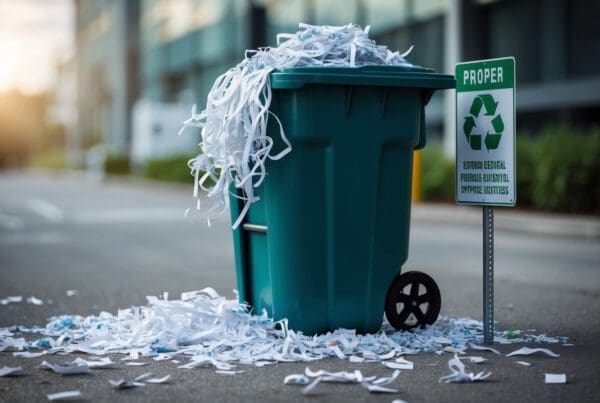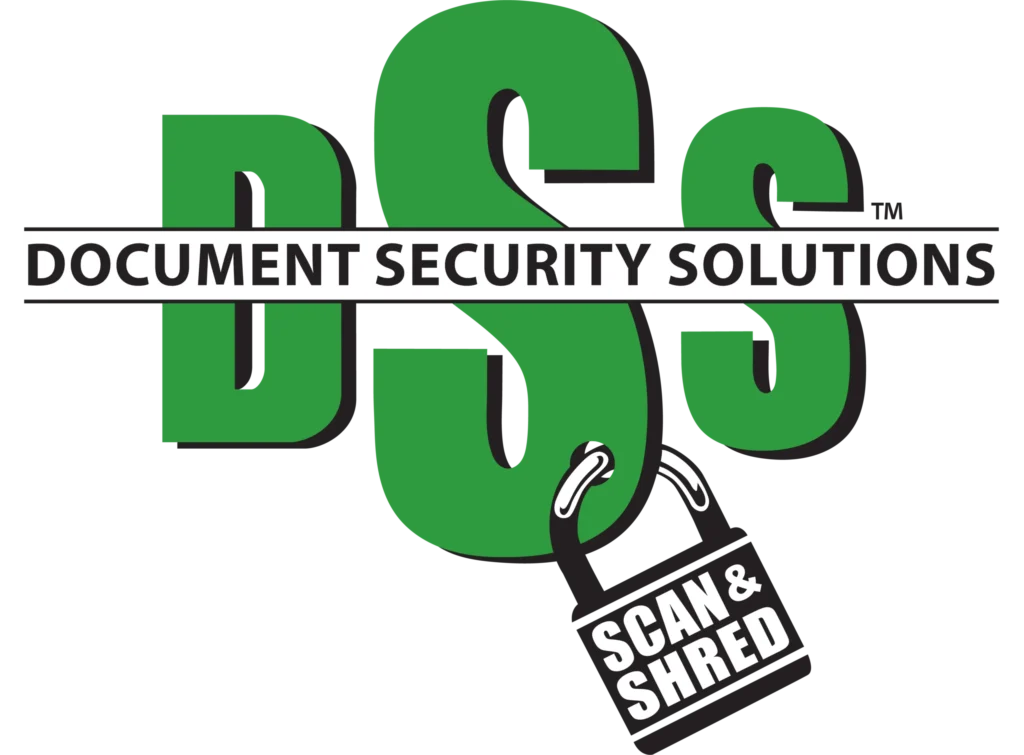Understanding the Importance of Document Shredding

Document shredding is crucial for protecting sensitive information from threats like identity theft and data breaches. A robust document destruction policy helps ensure data protection and compliance with legal requirements.
Consequences of Inadequate Document Destruction
If we fail to destroy documents properly, we risk exposing sensitive information. Identity thieves can find personal details in trash, leading to financial fraud. Data breaches often happen because of neglected shredding practices, posing a huge risk to businesses. Legal penalties may also arise if we fail to follow regulations. This can result in fines or legal actions. Businesses may also face reputational damage that can be hard to repair.
Lack of a strong shredding policy leaves information vulnerable. Inadequate destruction creates opportunities for unauthorized access. We must remember the importance of securely eliminating documents to prevent misuse. This not only protects individuals but also preserves the integrity of our business operations.
Elements of a Document Destruction Policy
A document destruction policy outlines procedures for safe data disposal. This policy should include key steps such as identifying sensitive documents that need shredding. We need to determine the retention period before data can be shredded. This ensures we keep important information only as long as needed.
Clear guidelines on document shredding processes should be set. This includes specifying the shredding equipment to use and who is responsible for execution. We must also ensure regular audits of the shredding process. This helps verify compliance with the policy and identify any necessary improvements.
Training staff on these procedures is essential. Everyone should understand the importance of following the shredding policy. This guarantees everyone plays a role in protecting sensitive information.
Identifying and Avoiding Shredding Mistakes

When handling confidential information, it’s crucial to correctly use shredders to maintain data security. Missteps in shredding can lead to data breaches and compliance issues.
Common Oversights in Office Shredder Usage
Many of us make simple mistakes with office shredders that can have serious consequences. One common oversight is overloading the shredder. This causes jams, leading to wasted time and potential mechanical failures. We should shred only the recommended number of sheets to avoid these issues.
Another mistake is neglecting regular maintenance of the shredder. Without proper care, shredders can wear out, leading to inefficient shredding and increased risks of data breaches. We must regularly oil blades and clear jams to keep our equipment running smoothly.
Failing to separate non-paper materials, like staples and clips, can also damage shredders. While some machines handle these materials, it’s safer to remove them to prevent malfunctions. This careful approach prolongs shredder life and improves data security.
Risks Associated with Inconsistent Shredding Practices
Inconsistent shredding practices create several risks. If we don’t regularly shred documents, we might violate data protection laws and expose sensitive information. Setting a shredding schedule helps ensure that confidential documents are handled promptly.
Another risk is relying solely on office shredders for all shredding needs. While suitable for day-to-day paper disposal, they might not handle larger volumes effectively. A certified shredding provider can manage bulk shredding, ensuring all data is destroyed correctly.
Lastly, ignoring the retention policy means keeping documents longer than necessary. Holding onto unnecessary papers increases the risk of data breaches. By following a clear retention policy, we minimize these risks and maintain compliance.
Ensuring Compliance with Shredding Regulations
We must be aware of shredding regulations to protect our organization. Understanding current laws helps us avoid penalties and fines. Staying informed about changes in regulations ensures our practices are up-to-date.
It’s important to choose the right shredding methods. Cross-cut shredders are often preferred since they provide smaller, more secure pieces. Consulting a certified shredding provider can give us expert advice on the best methods for our needs.
Regular audits of shredding practices help ensure compliance. By reviewing procedures, we can identify and correct any mistakes. Regularly updating training for employees also helps everyone understand the importance of secure shredding.
Establishing a Document Retention Policy

A well-thought-out document retention policy helps manage business records efficiently. It’s vital to create a clear retention schedule and maintain proper certification and documentation of shredding activities.
Creating a Retention Schedule
Setting up a retention schedule is essential for managing documents. We need to determine how long different types of documents should be kept. This involves categorizing documents based on their importance and legal requirements.
A retention schedule helps reduce clutter and ensures compliance with data protection laws. It’s important to review and update this schedule regularly. We should also communicate it clearly to everyone in the organization. Training sessions can help staff understand their roles in following the retention policy.
Certification and Documentation of Shredding Processes
Maintaining proper records of shredding activities is crucial. We should ensure that certificates of destruction are issued for every shredding event. These certificates serve as proof that the information has been securely destroyed.
It’s important to document details such as the date and method of shredding. This helps in audits and compliance checks. Having a secure process for documenting shredding ensures that we meet all regulatory requirements. We must keep these records organized and easily accessible for any inquiries or legal needs.
Choosing Professional Shredding Services
By choosing professional shredding services, we enhance document security and reduce data breach risks. Selecting certified providers ensures compliance and peace of mind.
Benefits of Certified Shredding Providers
Certified shredding providers offer higher security standards. They adhere to industry regulations, ensuring all documents are handled safely. This helps us avoid common document shredding mistakes, such as incomplete destruction or unsafe disposal.
We can also benefit from auditable processes. Certified shredding services provide documentation and certifications as proof of proper destruction, which is essential during audits.
Using professional shredding services can save us time and resources. They handle bulk shredding efficiently. This way, we can focus on our core business activities without worrying about document disposal.
Secure Shredding and Data Breach Prevention
Secure shredding is crucial in preventing data breaches. Professional shredding services use modern equipment that guarantees complete destruction. This prevents sensitive data from falling into the wrong hands.
By outsourcing to a professional shredding service, we ensure compliance with data protection laws. This reduces the risk of penalties associated with improper disposal of confidential information.
We gain peace of mind knowing that our data is secure. Professional services employ trained staff who follow strict security protocols throughout the shredding process. This reduces human error and ensures our data is handled with care.





